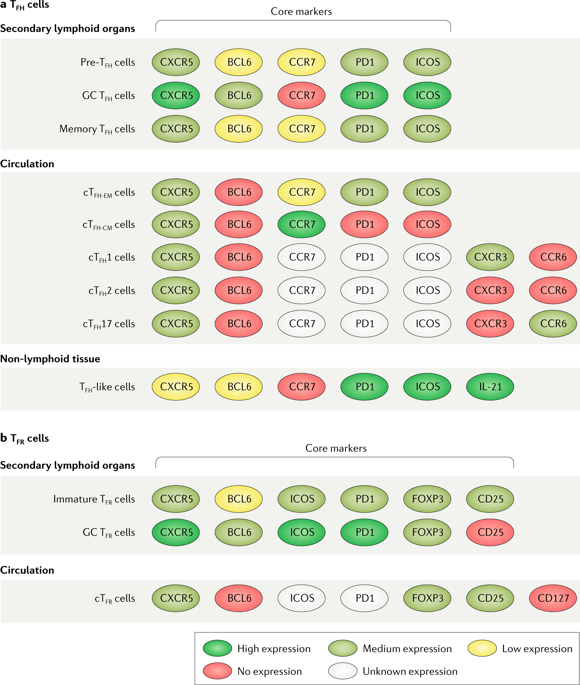当前位置:
X-MOL 学术
›
Nat. Rev. Rheumatol.
›
论文详情
Our official English website, www.x-mol.net, welcomes your
feedback! (Note: you will need to create a separate account there.)
T follicular helper cells and T follicular regulatory cells in rheumatic diseases.
Nature Reviews Rheumatology ( IF 29.4 ) Pub Date : 2019-07-09 , DOI: 10.1038/s41584-019-0254-2 Jun Deng 1, 2, 3 , Yunbo Wei 4 , Válter R Fonseca 5, 6 , Luis Graca 5, 7 , Di Yu 1, 2, 3, 4
Nature Reviews Rheumatology ( IF 29.4 ) Pub Date : 2019-07-09 , DOI: 10.1038/s41584-019-0254-2 Jun Deng 1, 2, 3 , Yunbo Wei 4 , Válter R Fonseca 5, 6 , Luis Graca 5, 7 , Di Yu 1, 2, 3, 4
Affiliation

|
As a hallmark of autoimmune rheumatic diseases, autoantibodies have been used in diagnosis for decades. However, the immunological mechanism underlying their generation has only become clear following the identification of T follicular helper (TFH) cells and T follicular regulatory (TFR) cells. TFH cells are instrumental in supporting antibody affinity maturation in germinal centre reactions and humoral memory formation, whereas TFR cells suppress TFH cell-mediated antibody responses. Evidence indicates that patients with autoimmune rheumatic diseases have increased numbers of TFH cells that can be hyperactive, and also potentially have altered numbers of TFR cells with reduced function, suggesting a conceivable dysregulation in the balance between TFH cells and TFR cells in these diseases. Therefore, by identifying the molecular mechanisms underlying the development and function of these cell populations, new opportunities have emerged to develop novel therapeutic targets. An increased knowledge of TFH cells and TFR cells has inspired, and hopefully will inspire more, approaches to reinstate the balance of these cells in the prevention and treatment of rheumatic diseases.
中文翻译:

风湿性疾病中的T卵泡辅助细胞和T卵泡调节细胞。
作为自身免疫性风湿性疾病的标志,自身抗体已用于诊断数十年。但是,只有在鉴定了T滤泡辅助细胞(TFH)和T滤泡调节(TFR)细胞之后,才知道其产生的免疫机制。TFH细胞在生发中心反应和体液记忆形成中支持抗体亲和力成熟,而TFR细胞则抑制TFH细胞介导的抗体反应。有证据表明,患有自身免疫性风湿病的患者增加了可能活跃的TFH细胞的数量,并且潜在地改变了功能降低的TFR细胞的数量,这表明在这些疾病中TFH细胞和TFR细胞之间的平衡可能发生失调。所以,通过确定这些细胞群的发育和功能的分子机制,出现了开发新的治疗靶标的新机会。在风湿性疾病的预防和治疗中,增加对TFH细胞和TFR细胞的了解已经激发并且希望会激发更多的方法来恢复这些细胞的平衡。
更新日期:2019-07-10
中文翻译:

风湿性疾病中的T卵泡辅助细胞和T卵泡调节细胞。
作为自身免疫性风湿性疾病的标志,自身抗体已用于诊断数十年。但是,只有在鉴定了T滤泡辅助细胞(TFH)和T滤泡调节(TFR)细胞之后,才知道其产生的免疫机制。TFH细胞在生发中心反应和体液记忆形成中支持抗体亲和力成熟,而TFR细胞则抑制TFH细胞介导的抗体反应。有证据表明,患有自身免疫性风湿病的患者增加了可能活跃的TFH细胞的数量,并且潜在地改变了功能降低的TFR细胞的数量,这表明在这些疾病中TFH细胞和TFR细胞之间的平衡可能发生失调。所以,通过确定这些细胞群的发育和功能的分子机制,出现了开发新的治疗靶标的新机会。在风湿性疾病的预防和治疗中,增加对TFH细胞和TFR细胞的了解已经激发并且希望会激发更多的方法来恢复这些细胞的平衡。





















































 京公网安备 11010802027423号
京公网安备 11010802027423号